An analysis of the impact of a leadership intervention on an undergraduate work-based learning project for human resource management students Trevor Gerhardt
VerifiedAdded on 2021/08/23
|10
|6482
|83
AI Summary
The current issue and full text archive of this journal is available on Emerald Insight at: www.emeraldinsight.com/2205-2062.htm An analysis of the impact of a leadership intervention on an undergraduate work-based learning project for human resource management students Trevor Gerhardt Impact of a leadership intervention 53 Received 15 September 2018 Revised 2 November 2018 Accepted 7 December 2018 WBL Department, GSM London Ltd, London, UK Abstract Purpose – The purpose of this paper is to analyse the impact of
Contribute Materials
Your contribution can guide someone’s learning journey. Share your
documents today.
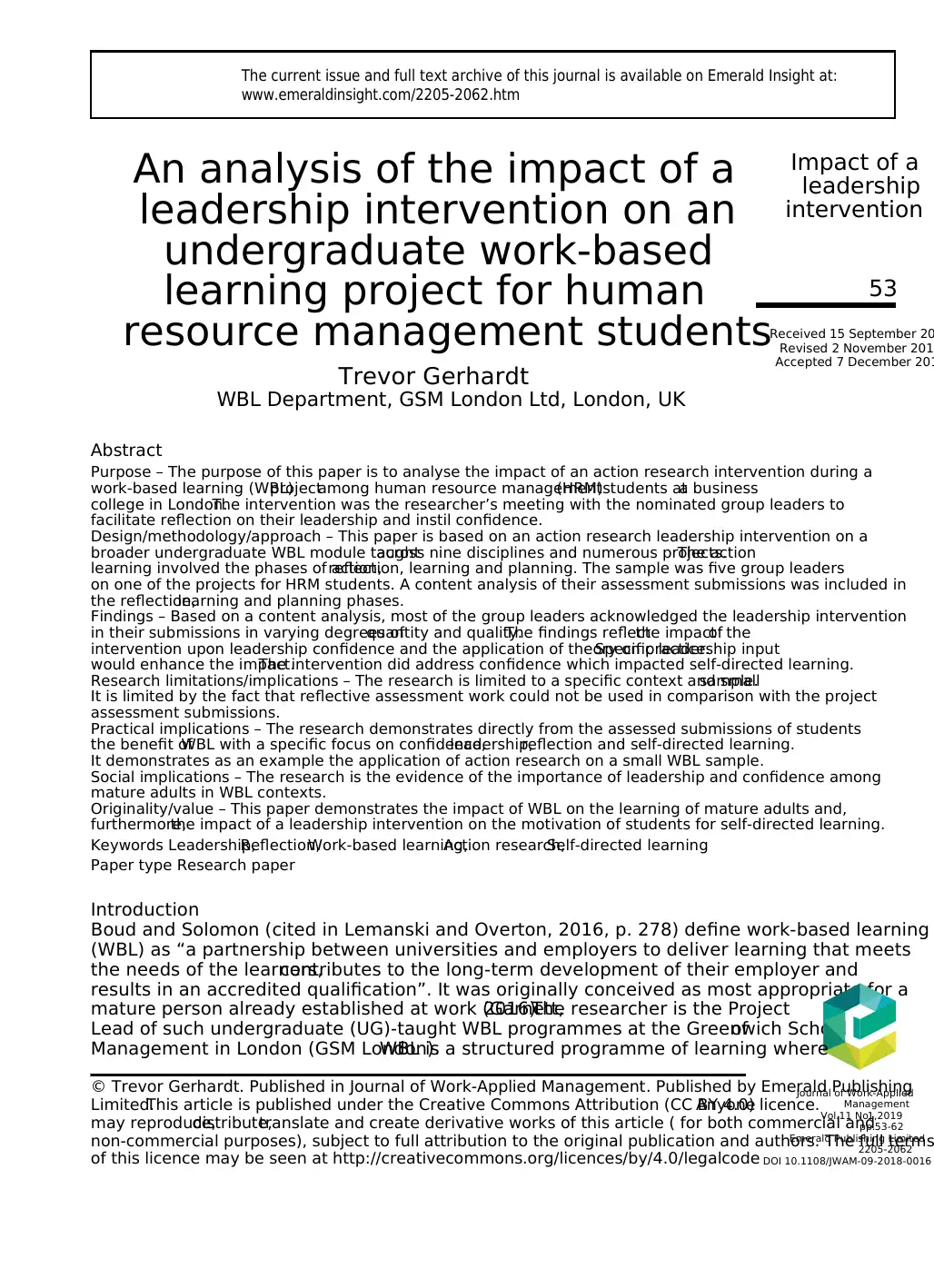
An analysis of the impact of a
leadership intervention on an
undergraduate work-based
learning project for human
resource management students
Trevor Gerhardt
WBL Department, GSM London Ltd, London, UK
Abstract
Purpose – The purpose of this paper is to analyse the impact of an action research intervention during a
work-based learning (WBL)projectamong human resource management(HRM)students ata business
college in London.The intervention was the researcher’s meeting with the nominated group leaders to
facilitate reflection on their leadership and instil confidence.
Design/methodology/approach – This paper is based on an action research leadership intervention on a
broader undergraduate WBL module taughtacross nine disciplines and numerous projects.The action
learning involved the phases of action,reflection, learning and planning. The sample was five group leaders
on one of the projects for HRM students. A content analysis of their assessment submissions was included in
the reflection,learning and planning phases.
Findings – Based on a content analysis, most of the group leaders acknowledged the leadership intervention
in their submissions in varying degrees ofquantity and quality.The findings reflectthe impactof the
intervention upon leadership confidence and the application of theory on practice.Specific leadership input
would enhance the impact.The intervention did address confidence which impacted self-directed learning.
Research limitations/implications – The research is limited to a specific context and smallsample.
It is limited by the fact that reflective assessment work could not be used in comparison with the project
assessment submissions.
Practical implications – The research demonstrates directly from the assessed submissions of students
the benefit ofWBL with a specific focus on confidence,leadership,reflection and self-directed learning.
It demonstrates as an example the application of action research on a small WBL sample.
Social implications – The research is the evidence of the importance of leadership and confidence among
mature adults in WBL contexts.
Originality/value – This paper demonstrates the impact of WBL on the learning of mature adults and,
furthermore,the impact of a leadership intervention on the motivation of students for self-directed learning.
Keywords Leadership,Reflection,Work-based learning,Action research,Self-directed learning
Paper type Research paper
Introduction
Boud and Solomon (cited in Lemanski and Overton, 2016, p. 278) define work-based learning
(WBL) as “a partnership between universities and employers to deliver learning that meets
the needs of the learners,contributes to the long-term development of their employer and
results in an accredited qualification”. It was originally conceived as most appropriate for a
mature person already established at work (Garnett,2016).The researcher is the Project
Lead of such undergraduate (UG)-taught WBL programmes at the Greenwich Schoolof
Management in London (GSM London).WBL is a structured programme of learning where
Journal of Work-Applied
Management
Vol.11 No.1,2019
pp.53-62
Emerald Publishing Limited
2205-2062
DOI 10.1108/JWAM-09-2018-0016
Received 15 September 20
Revised 2 November 201
Accepted 7 December 201
The current issue and full text archive of this journal is available on Emerald Insight at:
www.emeraldinsight.com/2205-2062.htm
© Trevor Gerhardt. Published in Journal of Work-Applied Management. Published by Emerald Publishing
Limited.This article is published under the Creative Commons Attribution (CC BY 4.0) licence.Anyone
may reproduce,distribute,translate and create derivative works of this article ( for both commercial and
non-commercial purposes), subject to full attribution to the original publication and authors. The full terms
of this licence may be seen at http://creativecommons.org/licences/by/4.0/legalcode
53
Impact of a
leadership
intervention
leadership intervention on an
undergraduate work-based
learning project for human
resource management students
Trevor Gerhardt
WBL Department, GSM London Ltd, London, UK
Abstract
Purpose – The purpose of this paper is to analyse the impact of an action research intervention during a
work-based learning (WBL)projectamong human resource management(HRM)students ata business
college in London.The intervention was the researcher’s meeting with the nominated group leaders to
facilitate reflection on their leadership and instil confidence.
Design/methodology/approach – This paper is based on an action research leadership intervention on a
broader undergraduate WBL module taughtacross nine disciplines and numerous projects.The action
learning involved the phases of action,reflection, learning and planning. The sample was five group leaders
on one of the projects for HRM students. A content analysis of their assessment submissions was included in
the reflection,learning and planning phases.
Findings – Based on a content analysis, most of the group leaders acknowledged the leadership intervention
in their submissions in varying degrees ofquantity and quality.The findings reflectthe impactof the
intervention upon leadership confidence and the application of theory on practice.Specific leadership input
would enhance the impact.The intervention did address confidence which impacted self-directed learning.
Research limitations/implications – The research is limited to a specific context and smallsample.
It is limited by the fact that reflective assessment work could not be used in comparison with the project
assessment submissions.
Practical implications – The research demonstrates directly from the assessed submissions of students
the benefit ofWBL with a specific focus on confidence,leadership,reflection and self-directed learning.
It demonstrates as an example the application of action research on a small WBL sample.
Social implications – The research is the evidence of the importance of leadership and confidence among
mature adults in WBL contexts.
Originality/value – This paper demonstrates the impact of WBL on the learning of mature adults and,
furthermore,the impact of a leadership intervention on the motivation of students for self-directed learning.
Keywords Leadership,Reflection,Work-based learning,Action research,Self-directed learning
Paper type Research paper
Introduction
Boud and Solomon (cited in Lemanski and Overton, 2016, p. 278) define work-based learning
(WBL) as “a partnership between universities and employers to deliver learning that meets
the needs of the learners,contributes to the long-term development of their employer and
results in an accredited qualification”. It was originally conceived as most appropriate for a
mature person already established at work (Garnett,2016).The researcher is the Project
Lead of such undergraduate (UG)-taught WBL programmes at the Greenwich Schoolof
Management in London (GSM London).WBL is a structured programme of learning where
Journal of Work-Applied
Management
Vol.11 No.1,2019
pp.53-62
Emerald Publishing Limited
2205-2062
DOI 10.1108/JWAM-09-2018-0016
Received 15 September 20
Revised 2 November 201
Accepted 7 December 201
The current issue and full text archive of this journal is available on Emerald Insight at:
www.emeraldinsight.com/2205-2062.htm
© Trevor Gerhardt. Published in Journal of Work-Applied Management. Published by Emerald Publishing
Limited.This article is published under the Creative Commons Attribution (CC BY 4.0) licence.Anyone
may reproduce,distribute,translate and create derivative works of this article ( for both commercial and
non-commercial purposes), subject to full attribution to the original publication and authors. The full terms
of this licence may be seen at http://creativecommons.org/licences/by/4.0/legalcode
53
Impact of a
leadership
intervention
Secure Best Marks with AI Grader
Need help grading? Try our AI Grader for instant feedback on your assignments.
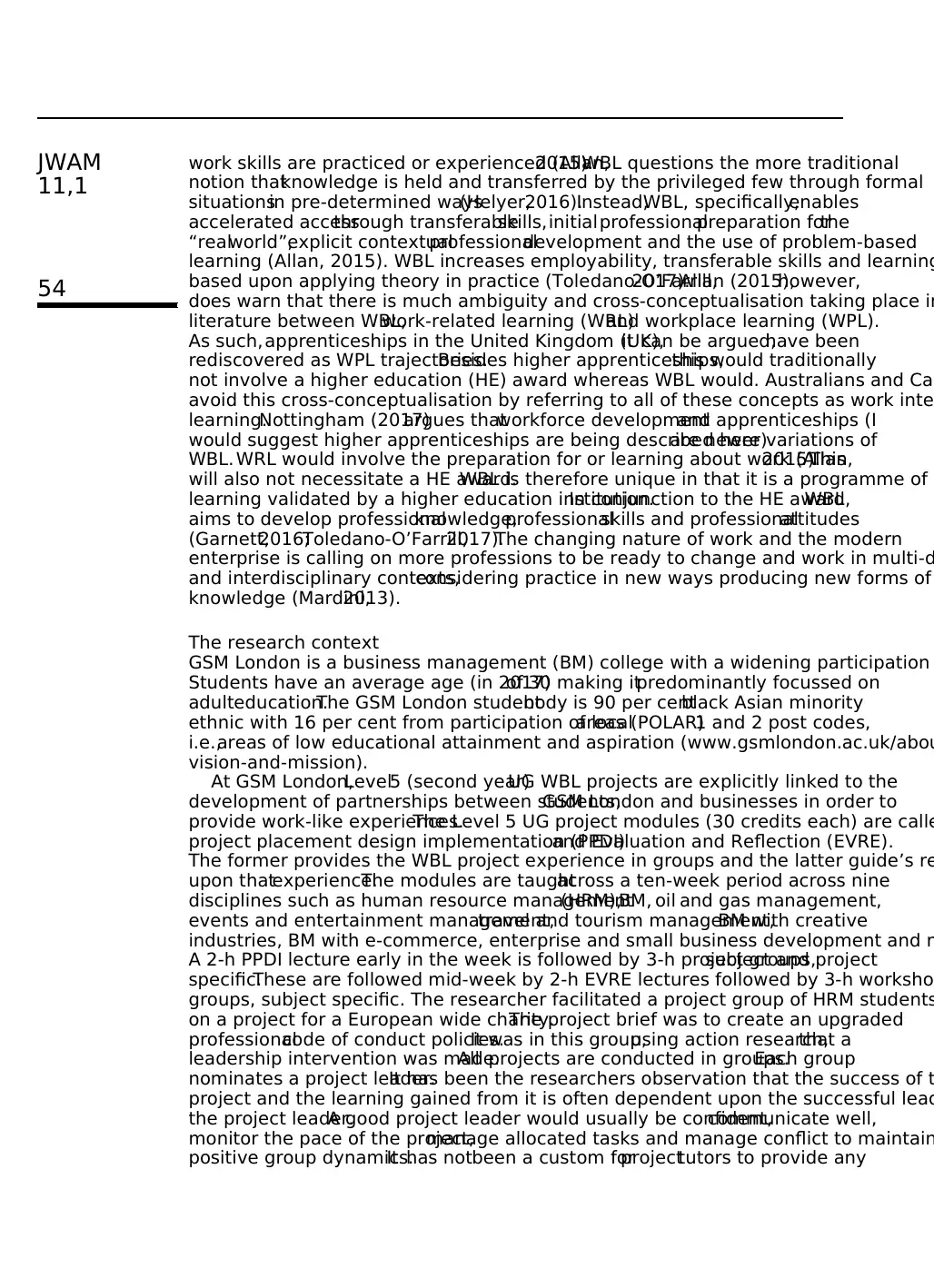
work skills are practiced or experienced (Allan,2015).WBL questions the more traditional
notion thatknowledge is held and transferred by the privileged few through formal
situationsin pre-determined ways(Helyer,2016).Instead,WBL, specifically,enables
accelerated accessthrough transferableskills,initialprofessionalpreparation forthe
“realworld”,explicit contextualprofessionaldevelopment and the use of problem-based
learning (Allan, 2015). WBL increases employability, transferable skills and learning
based upon applying theory in practice (Toledano-O’Farrill,2017).Allan (2015),however,
does warn that there is much ambiguity and cross-conceptualisation taking place in
literature between WBL,work-related learning (WRL)and workplace learning (WPL).
As such,apprenticeships in the United Kingdom (UK),it can be argued,have been
rediscovered as WPL trajectories.Besides higher apprenticeships,this would traditionally
not involve a higher education (HE) award whereas WBL would. Australians and Can
avoid this cross-conceptualisation by referring to all of these concepts as work inte
learning.Nottingham (2017)argues thatworkforce developmentand apprenticeships (I
would suggest higher apprenticeships are being described here)are newer variations of
WBL. WRL would involve the preparation for or learning about work (Allan,2015).This
will also not necessitate a HE award.WBL is therefore unique in that it is a programme of
learning validated by a higher education institution.In conjunction to the HE award,WBL
aims to develop professionalknowledge,professionalskills and professionalattitudes
(Garnett,2016;Toledano-O’Farrill,2017).The changing nature of work and the modern
enterprise is calling on more professions to be ready to change and work in multi-d
and interdisciplinary contexts,considering practice in new ways producing new forms of
knowledge (Mardini,2013).
The research context
GSM London is a business management (BM) college with a widening participation
Students have an average age (in 2017)of 30 making itpredominantly focussed on
adulteducation.The GSM London studentbody is 90 per centblack Asian minority
ethnic with 16 per cent from participation of localareas (POLAR)1 and 2 post codes,
i.e.,areas of low educational attainment and aspiration (www.gsmlondon.ac.uk/abou
vision-and-mission).
At GSM London,Level5 (second year)UG WBL projects are explicitly linked to the
development of partnerships between students,GSM London and businesses in order to
provide work-like experiences.The Level 5 UG project modules (30 credits each) are calle
project placement design implementation (PPDI)and Evaluation and Reflection (EVRE).
The former provides the WBL project experience in groups and the latter guide’s re
upon thatexperience.The modules are taughtacross a ten-week period across nine
disciplines such as human resource management(HRM),BM, oil and gas management,
events and entertainment management,travel and tourism management,BM with creative
industries, BM with e-commerce, enterprise and small business development and m
A 2-h PPDI lecture early in the week is followed by 3-h project groups,subject and project
specific.These are followed mid-week by 2-h EVRE lectures followed by 3-h worksho
groups, subject specific. The researcher facilitated a project group of HRM students
on a project for a European wide charity.The project brief was to create an upgraded
professionalcode of conduct policies.It was in this group,using action research,that a
leadership intervention was made.All projects are conducted in groups.Each group
nominates a project leader.It has been the researchers observation that the success of t
project and the learning gained from it is often dependent upon the successful lead
the project leader.A good project leader would usually be confident,communicate well,
monitor the pace of the project,manage allocated tasks and manage conflict to maintain
positive group dynamics.It has notbeen a custom forprojecttutors to provide any
54
JWAM
11,1
notion thatknowledge is held and transferred by the privileged few through formal
situationsin pre-determined ways(Helyer,2016).Instead,WBL, specifically,enables
accelerated accessthrough transferableskills,initialprofessionalpreparation forthe
“realworld”,explicit contextualprofessionaldevelopment and the use of problem-based
learning (Allan, 2015). WBL increases employability, transferable skills and learning
based upon applying theory in practice (Toledano-O’Farrill,2017).Allan (2015),however,
does warn that there is much ambiguity and cross-conceptualisation taking place in
literature between WBL,work-related learning (WRL)and workplace learning (WPL).
As such,apprenticeships in the United Kingdom (UK),it can be argued,have been
rediscovered as WPL trajectories.Besides higher apprenticeships,this would traditionally
not involve a higher education (HE) award whereas WBL would. Australians and Can
avoid this cross-conceptualisation by referring to all of these concepts as work inte
learning.Nottingham (2017)argues thatworkforce developmentand apprenticeships (I
would suggest higher apprenticeships are being described here)are newer variations of
WBL. WRL would involve the preparation for or learning about work (Allan,2015).This
will also not necessitate a HE award.WBL is therefore unique in that it is a programme of
learning validated by a higher education institution.In conjunction to the HE award,WBL
aims to develop professionalknowledge,professionalskills and professionalattitudes
(Garnett,2016;Toledano-O’Farrill,2017).The changing nature of work and the modern
enterprise is calling on more professions to be ready to change and work in multi-d
and interdisciplinary contexts,considering practice in new ways producing new forms of
knowledge (Mardini,2013).
The research context
GSM London is a business management (BM) college with a widening participation
Students have an average age (in 2017)of 30 making itpredominantly focussed on
adulteducation.The GSM London studentbody is 90 per centblack Asian minority
ethnic with 16 per cent from participation of localareas (POLAR)1 and 2 post codes,
i.e.,areas of low educational attainment and aspiration (www.gsmlondon.ac.uk/abou
vision-and-mission).
At GSM London,Level5 (second year)UG WBL projects are explicitly linked to the
development of partnerships between students,GSM London and businesses in order to
provide work-like experiences.The Level 5 UG project modules (30 credits each) are calle
project placement design implementation (PPDI)and Evaluation and Reflection (EVRE).
The former provides the WBL project experience in groups and the latter guide’s re
upon thatexperience.The modules are taughtacross a ten-week period across nine
disciplines such as human resource management(HRM),BM, oil and gas management,
events and entertainment management,travel and tourism management,BM with creative
industries, BM with e-commerce, enterprise and small business development and m
A 2-h PPDI lecture early in the week is followed by 3-h project groups,subject and project
specific.These are followed mid-week by 2-h EVRE lectures followed by 3-h worksho
groups, subject specific. The researcher facilitated a project group of HRM students
on a project for a European wide charity.The project brief was to create an upgraded
professionalcode of conduct policies.It was in this group,using action research,that a
leadership intervention was made.All projects are conducted in groups.Each group
nominates a project leader.It has been the researchers observation that the success of t
project and the learning gained from it is often dependent upon the successful lead
the project leader.A good project leader would usually be confident,communicate well,
monitor the pace of the project,manage allocated tasks and manage conflict to maintain
positive group dynamics.It has notbeen a custom forprojecttutors to provide any
54
JWAM
11,1
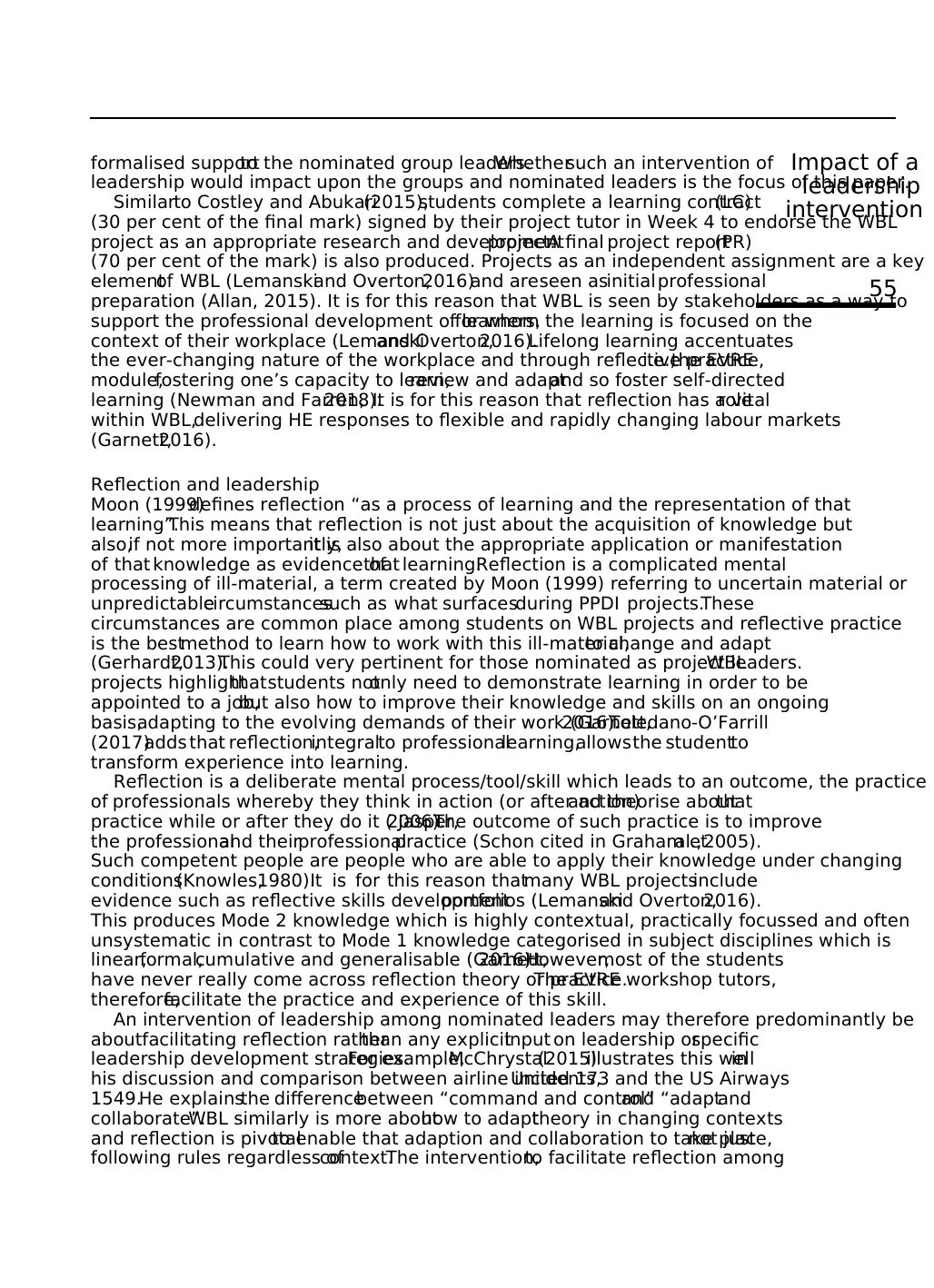
formalised supportto the nominated group leaders.Whethersuch an intervention of
leadership would impact upon the groups and nominated leaders is the focus of this paper.
Similarto Costley and Abukari(2015),students complete a learning contract(LC)
(30 per cent of the final mark) signed by their project tutor in Week 4 to endorse the WBL
project as an appropriate research and developmentproject.A final project report(PR)
(70 per cent of the mark) is also produced. Projects as an independent assignment are a key
elementof WBL (Lemanskiand Overton,2016)and areseen asinitial professional
preparation (Allan, 2015). It is for this reason that WBL is seen by stakeholders as a way to
support the professional development of learners,for whom the learning is focused on the
context of their workplace (Lemanskiand Overton,2016).Lifelong learning accentuates
the ever-changing nature of the workplace and through reflective practice,i.e.,the EVRE
module,fostering one’s capacity to learn,review and adaptand so foster self-directed
learning (Newman and Farren,2018).It is for this reason that reflection has a vitalrole
within WBL,delivering HE responses to flexible and rapidly changing labour markets
(Garnett,2016).
Reflection and leadership
Moon (1999)defines reflection “as a process of learning and the representation of that
learning”.This means that reflection is not just about the acquisition of knowledge but
also,if not more importantly,it is also about the appropriate application or manifestation
of that knowledge as evidence ofthat learning.Reflection is a complicated mental
processing of ill-material, a term created by Moon (1999) referring to uncertain material or
unpredictablecircumstancessuch as what surfacesduring PPDI projects.These
circumstances are common place among students on WBL projects and reflective practice
is the bestmethod to learn how to work with this ill-material,to change and adapt
(Gerhardt,2013).This could very pertinent for those nominated as project leaders.WBL
projects highlightthatstudents notonly need to demonstrate learning in order to be
appointed to a job,but also how to improve their knowledge and skills on an ongoing
basis,adapting to the evolving demands of their work (Garnett,2016).Toledano-O’Farrill
(2017)adds that reflection,integralto professionallearning,allowsthe studentto
transform experience into learning.
Reflection is a deliberate mental process/tool/skill which leads to an outcome, the practice
of professionals whereby they think in action (or after action)and theorise aboutthat
practice while or after they do it ( Jasper,2006).The outcome of such practice is to improve
the professionaland theirprofessionalpractice (Schon cited in Graham etal.,2005).
Such competent people are people who are able to apply their knowledge under changing
conditions(Knowles,1980).It is for this reason thatmany WBL projectsinclude
evidence such as reflective skills developmentportfolios (Lemanskiand Overton,2016).
This produces Mode 2 knowledge which is highly contextual, practically focussed and often
unsystematic in contrast to Mode 1 knowledge categorised in subject disciplines which is
linear,formal,cumulative and generalisable (Garnett,2016).However,most of the students
have never really come across reflection theory or practice.The EVRE workshop tutors,
therefore,facilitate the practice and experience of this skill.
An intervention of leadership among nominated leaders may therefore predominantly be
aboutfacilitating reflection ratherthan any explicitinput on leadership orspecific
leadership development strategies.For example,McChrystal(2015)illustrates this wellin
his discussion and comparison between airline incidents,United 173 and the US Airways
1549.He explainsthe differencebetween “command and control”and “adaptand
collaborate”.WBL similarly is more abouthow to adapttheory in changing contexts
and reflection is pivotalto enable that adaption and collaboration to take place,not just
following rules regardless ofcontext.The intervention,to facilitate reflection among
55
Impact of a
leadership
intervention
leadership would impact upon the groups and nominated leaders is the focus of this paper.
Similarto Costley and Abukari(2015),students complete a learning contract(LC)
(30 per cent of the final mark) signed by their project tutor in Week 4 to endorse the WBL
project as an appropriate research and developmentproject.A final project report(PR)
(70 per cent of the mark) is also produced. Projects as an independent assignment are a key
elementof WBL (Lemanskiand Overton,2016)and areseen asinitial professional
preparation (Allan, 2015). It is for this reason that WBL is seen by stakeholders as a way to
support the professional development of learners,for whom the learning is focused on the
context of their workplace (Lemanskiand Overton,2016).Lifelong learning accentuates
the ever-changing nature of the workplace and through reflective practice,i.e.,the EVRE
module,fostering one’s capacity to learn,review and adaptand so foster self-directed
learning (Newman and Farren,2018).It is for this reason that reflection has a vitalrole
within WBL,delivering HE responses to flexible and rapidly changing labour markets
(Garnett,2016).
Reflection and leadership
Moon (1999)defines reflection “as a process of learning and the representation of that
learning”.This means that reflection is not just about the acquisition of knowledge but
also,if not more importantly,it is also about the appropriate application or manifestation
of that knowledge as evidence ofthat learning.Reflection is a complicated mental
processing of ill-material, a term created by Moon (1999) referring to uncertain material or
unpredictablecircumstancessuch as what surfacesduring PPDI projects.These
circumstances are common place among students on WBL projects and reflective practice
is the bestmethod to learn how to work with this ill-material,to change and adapt
(Gerhardt,2013).This could very pertinent for those nominated as project leaders.WBL
projects highlightthatstudents notonly need to demonstrate learning in order to be
appointed to a job,but also how to improve their knowledge and skills on an ongoing
basis,adapting to the evolving demands of their work (Garnett,2016).Toledano-O’Farrill
(2017)adds that reflection,integralto professionallearning,allowsthe studentto
transform experience into learning.
Reflection is a deliberate mental process/tool/skill which leads to an outcome, the practice
of professionals whereby they think in action (or after action)and theorise aboutthat
practice while or after they do it ( Jasper,2006).The outcome of such practice is to improve
the professionaland theirprofessionalpractice (Schon cited in Graham etal.,2005).
Such competent people are people who are able to apply their knowledge under changing
conditions(Knowles,1980).It is for this reason thatmany WBL projectsinclude
evidence such as reflective skills developmentportfolios (Lemanskiand Overton,2016).
This produces Mode 2 knowledge which is highly contextual, practically focussed and often
unsystematic in contrast to Mode 1 knowledge categorised in subject disciplines which is
linear,formal,cumulative and generalisable (Garnett,2016).However,most of the students
have never really come across reflection theory or practice.The EVRE workshop tutors,
therefore,facilitate the practice and experience of this skill.
An intervention of leadership among nominated leaders may therefore predominantly be
aboutfacilitating reflection ratherthan any explicitinput on leadership orspecific
leadership development strategies.For example,McChrystal(2015)illustrates this wellin
his discussion and comparison between airline incidents,United 173 and the US Airways
1549.He explainsthe differencebetween “command and control”and “adaptand
collaborate”.WBL similarly is more abouthow to adapttheory in changing contexts
and reflection is pivotalto enable that adaption and collaboration to take place,not just
following rules regardless ofcontext.The intervention,to facilitate reflection among
55
Impact of a
leadership
intervention
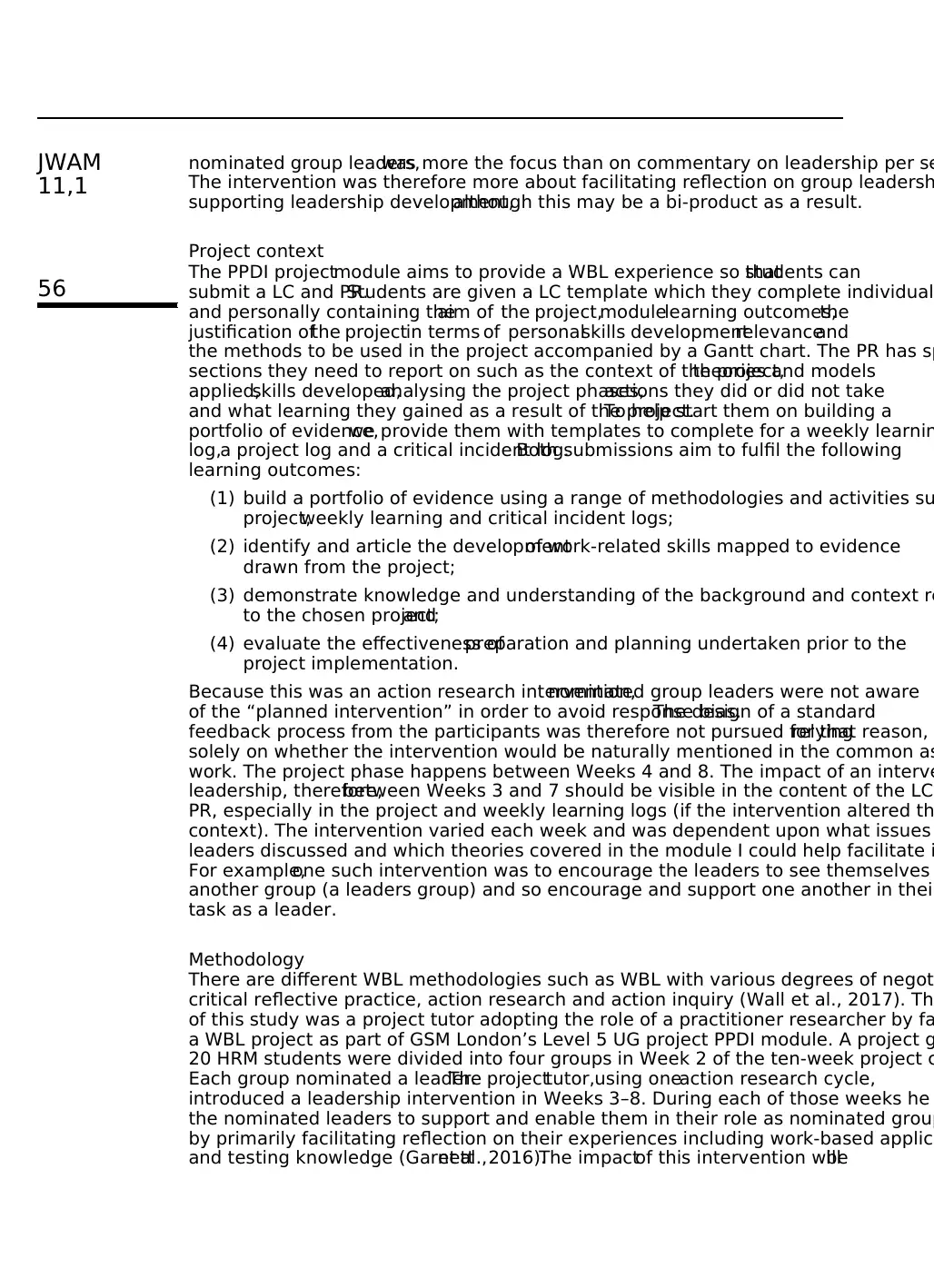
nominated group leaders,was more the focus than on commentary on leadership per se
The intervention was therefore more about facilitating reflection on group leadersh
supporting leadership development,although this may be a bi-product as a result.
Project context
The PPDI projectmodule aims to provide a WBL experience so thatstudents can
submit a LC and PR.Students are given a LC template which they complete individual
and personally containing theaim of the project,modulelearning outcomes,the
justification ofthe projectin terms of personalskills developmentrelevanceand
the methods to be used in the project accompanied by a Gantt chart. The PR has sp
sections they need to report on such as the context of the project,theories and models
applied,skills developed,analysing the project phases,actions they did or did not take
and what learning they gained as a result of the project.To help start them on building a
portfolio of evidence,we provide them with templates to complete for a weekly learnin
log,a project log and a critical incident log.Both submissions aim to fulfil the following
learning outcomes:
(1) build a portfolio of evidence using a range of methodologies and activities su
project,weekly learning and critical incident logs;
(2) identify and article the developmentof work-related skills mapped to evidence
drawn from the project;
(3) demonstrate knowledge and understanding of the background and context re
to the chosen project;and
(4) evaluate the effectiveness ofpreparation and planning undertaken prior to the
project implementation.
Because this was an action research intervention,nominated group leaders were not aware
of the “planned intervention” in order to avoid response bias.The design of a standard
feedback process from the participants was therefore not pursued for that reason,relying
solely on whether the intervention would be naturally mentioned in the common as
work. The project phase happens between Weeks 4 and 8. The impact of an interve
leadership, therefore,between Weeks 3 and 7 should be visible in the content of the LC
PR, especially in the project and weekly learning logs (if the intervention altered th
context). The intervention varied each week and was dependent upon what issues
leaders discussed and which theories covered in the module I could help facilitate i
For example,one such intervention was to encourage the leaders to see themselves
another group (a leaders group) and so encourage and support one another in their
task as a leader.
Methodology
There are different WBL methodologies such as WBL with various degrees of negot
critical reflective practice, action research and action inquiry (Wall et al., 2017). Th
of this study was a project tutor adopting the role of a practitioner researcher by fa
a WBL project as part of GSM London’s Level 5 UG project PPDI module. A project g
20 HRM students were divided into four groups in Week 2 of the ten-week project c
Each group nominated a leader.The projecttutor,using oneaction research cycle,
introduced a leadership intervention in Weeks 3–8. During each of those weeks he
the nominated leaders to support and enable them in their role as nominated group
by primarily facilitating reflection on their experiences including work-based applica
and testing knowledge (Garnettet al.,2016).The impactof this intervention willbe
56
JWAM
11,1
The intervention was therefore more about facilitating reflection on group leadersh
supporting leadership development,although this may be a bi-product as a result.
Project context
The PPDI projectmodule aims to provide a WBL experience so thatstudents can
submit a LC and PR.Students are given a LC template which they complete individual
and personally containing theaim of the project,modulelearning outcomes,the
justification ofthe projectin terms of personalskills developmentrelevanceand
the methods to be used in the project accompanied by a Gantt chart. The PR has sp
sections they need to report on such as the context of the project,theories and models
applied,skills developed,analysing the project phases,actions they did or did not take
and what learning they gained as a result of the project.To help start them on building a
portfolio of evidence,we provide them with templates to complete for a weekly learnin
log,a project log and a critical incident log.Both submissions aim to fulfil the following
learning outcomes:
(1) build a portfolio of evidence using a range of methodologies and activities su
project,weekly learning and critical incident logs;
(2) identify and article the developmentof work-related skills mapped to evidence
drawn from the project;
(3) demonstrate knowledge and understanding of the background and context re
to the chosen project;and
(4) evaluate the effectiveness ofpreparation and planning undertaken prior to the
project implementation.
Because this was an action research intervention,nominated group leaders were not aware
of the “planned intervention” in order to avoid response bias.The design of a standard
feedback process from the participants was therefore not pursued for that reason,relying
solely on whether the intervention would be naturally mentioned in the common as
work. The project phase happens between Weeks 4 and 8. The impact of an interve
leadership, therefore,between Weeks 3 and 7 should be visible in the content of the LC
PR, especially in the project and weekly learning logs (if the intervention altered th
context). The intervention varied each week and was dependent upon what issues
leaders discussed and which theories covered in the module I could help facilitate i
For example,one such intervention was to encourage the leaders to see themselves
another group (a leaders group) and so encourage and support one another in their
task as a leader.
Methodology
There are different WBL methodologies such as WBL with various degrees of negot
critical reflective practice, action research and action inquiry (Wall et al., 2017). Th
of this study was a project tutor adopting the role of a practitioner researcher by fa
a WBL project as part of GSM London’s Level 5 UG project PPDI module. A project g
20 HRM students were divided into four groups in Week 2 of the ten-week project c
Each group nominated a leader.The projecttutor,using oneaction research cycle,
introduced a leadership intervention in Weeks 3–8. During each of those weeks he
the nominated leaders to support and enable them in their role as nominated group
by primarily facilitating reflection on their experiences including work-based applica
and testing knowledge (Garnettet al.,2016).The impactof this intervention willbe
56
JWAM
11,1
Secure Best Marks with AI Grader
Need help grading? Try our AI Grader for instant feedback on your assignments.
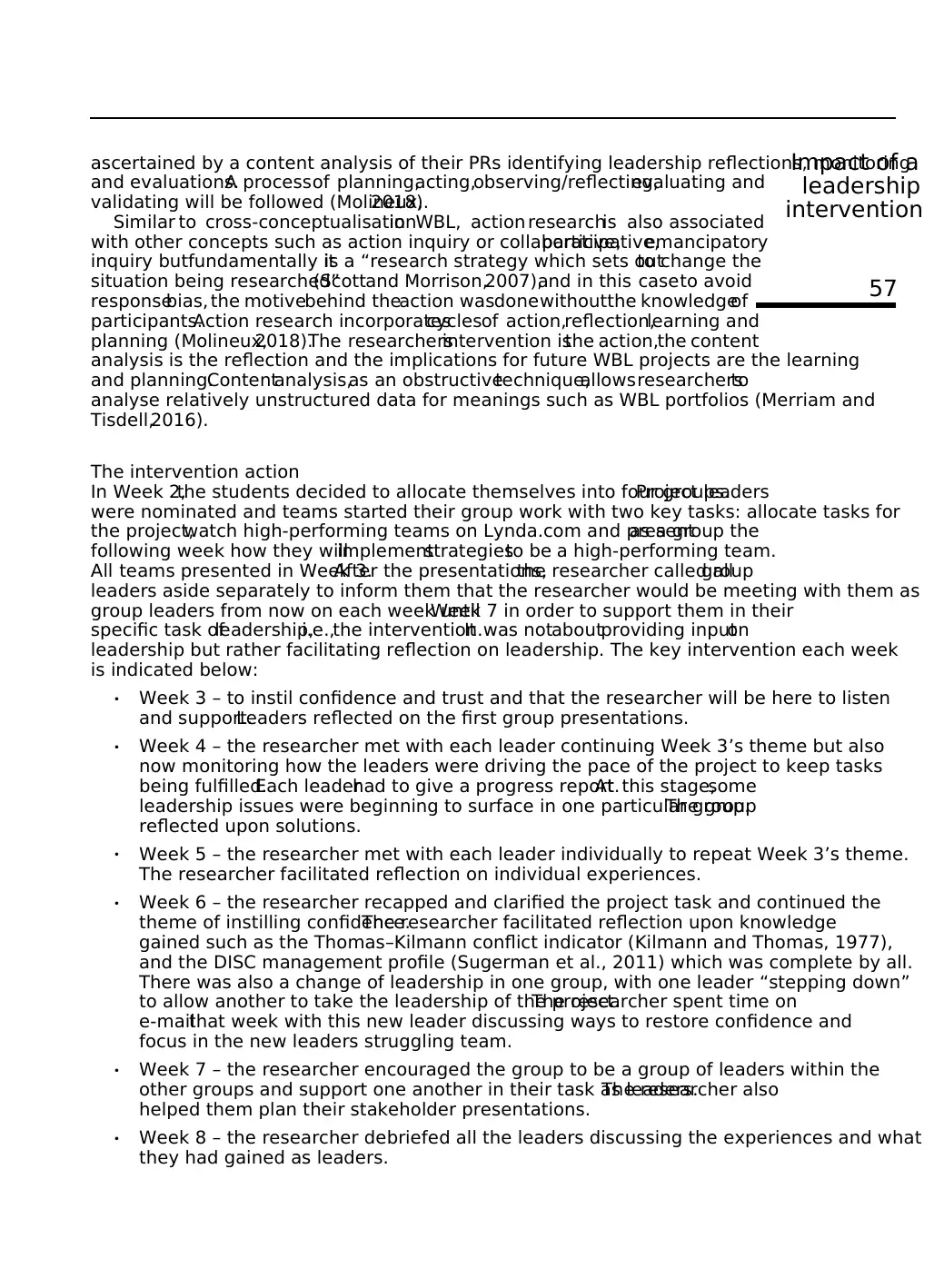
ascertained by a content analysis of their PRs identifying leadership reflections, monitoring
and evaluations.A processof planning,acting,observing/reflecting,evaluating and
validating will be followed (Molineux,2018).
Similar to cross-conceptualisationin WBL, action researchis also associated
with other concepts such as action inquiry or collaborative,participative,emancipatory
inquiry butfundamentally itis a “research strategy which sets outto change the
situation being researched”(Scottand Morrison,2007),and in this caseto avoid
responsebias, the motivebehind theaction wasdonewithoutthe knowledgeof
participants.Action research incorporatescyclesof action,reflection,learning and
planning (Molineux,2018).The researchersintervention isthe action,the content
analysis is the reflection and the implications for future WBL projects are the learning
and planning.Contentanalysis,as an obstructivetechnique,allowsresearchersto
analyse relatively unstructured data for meanings such as WBL portfolios (Merriam and
Tisdell,2016).
The intervention action
In Week 2,the students decided to allocate themselves into four groups.Project leaders
were nominated and teams started their group work with two key tasks: allocate tasks for
the project,watch high-performing teams on Lynda.com and presentas a group the
following week how they willimplementstrategiesto be a high-performing team.
All teams presented in Week 3.After the presentations,the researcher called allgroup
leaders aside separately to inform them that the researcher would be meeting with them as
group leaders from now on each week untilWeek 7 in order to support them in their
specific task ofleadership,i.e.,the intervention.It was notaboutproviding inputon
leadership but rather facilitating reflection on leadership. The key intervention each week
is indicated below:
• Week 3 – to instil confidence and trust and that the researcher will be here to listen
and support.Leaders reflected on the first group presentations.
• Week 4 – the researcher met with each leader continuing Week 3’s theme but also
now monitoring how the leaders were driving the pace of the project to keep tasks
being fulfilled.Each leaderhad to give a progress report.At this stage,some
leadership issues were beginning to surface in one particular group.The group
reflected upon solutions.
• Week 5 – the researcher met with each leader individually to repeat Week 3’s theme.
The researcher facilitated reflection on individual experiences.
• Week 6 – the researcher recapped and clarified the project task and continued the
theme of instilling confidence.The researcher facilitated reflection upon knowledge
gained such as the Thomas–Kilmann conflict indicator (Kilmann and Thomas, 1977),
and the DISC management profile (Sugerman et al., 2011) which was complete by all.
There was also a change of leadership in one group, with one leader “stepping down”
to allow another to take the leadership of the project.The researcher spent time on
e-mailthat week with this new leader discussing ways to restore confidence and
focus in the new leaders struggling team.
• Week 7 – the researcher encouraged the group to be a group of leaders within the
other groups and support one another in their task as leaders.The researcher also
helped them plan their stakeholder presentations.
• Week 8 – the researcher debriefed all the leaders discussing the experiences and what
they had gained as leaders.
57
Impact of a
leadership
intervention
and evaluations.A processof planning,acting,observing/reflecting,evaluating and
validating will be followed (Molineux,2018).
Similar to cross-conceptualisationin WBL, action researchis also associated
with other concepts such as action inquiry or collaborative,participative,emancipatory
inquiry butfundamentally itis a “research strategy which sets outto change the
situation being researched”(Scottand Morrison,2007),and in this caseto avoid
responsebias, the motivebehind theaction wasdonewithoutthe knowledgeof
participants.Action research incorporatescyclesof action,reflection,learning and
planning (Molineux,2018).The researchersintervention isthe action,the content
analysis is the reflection and the implications for future WBL projects are the learning
and planning.Contentanalysis,as an obstructivetechnique,allowsresearchersto
analyse relatively unstructured data for meanings such as WBL portfolios (Merriam and
Tisdell,2016).
The intervention action
In Week 2,the students decided to allocate themselves into four groups.Project leaders
were nominated and teams started their group work with two key tasks: allocate tasks for
the project,watch high-performing teams on Lynda.com and presentas a group the
following week how they willimplementstrategiesto be a high-performing team.
All teams presented in Week 3.After the presentations,the researcher called allgroup
leaders aside separately to inform them that the researcher would be meeting with them as
group leaders from now on each week untilWeek 7 in order to support them in their
specific task ofleadership,i.e.,the intervention.It was notaboutproviding inputon
leadership but rather facilitating reflection on leadership. The key intervention each week
is indicated below:
• Week 3 – to instil confidence and trust and that the researcher will be here to listen
and support.Leaders reflected on the first group presentations.
• Week 4 – the researcher met with each leader continuing Week 3’s theme but also
now monitoring how the leaders were driving the pace of the project to keep tasks
being fulfilled.Each leaderhad to give a progress report.At this stage,some
leadership issues were beginning to surface in one particular group.The group
reflected upon solutions.
• Week 5 – the researcher met with each leader individually to repeat Week 3’s theme.
The researcher facilitated reflection on individual experiences.
• Week 6 – the researcher recapped and clarified the project task and continued the
theme of instilling confidence.The researcher facilitated reflection upon knowledge
gained such as the Thomas–Kilmann conflict indicator (Kilmann and Thomas, 1977),
and the DISC management profile (Sugerman et al., 2011) which was complete by all.
There was also a change of leadership in one group, with one leader “stepping down”
to allow another to take the leadership of the project.The researcher spent time on
e-mailthat week with this new leader discussing ways to restore confidence and
focus in the new leaders struggling team.
• Week 7 – the researcher encouraged the group to be a group of leaders within the
other groups and support one another in their task as leaders.The researcher also
helped them plan their stakeholder presentations.
• Week 8 – the researcher debriefed all the leaders discussing the experiences and what
they had gained as leaders.
57
Impact of a
leadership
intervention
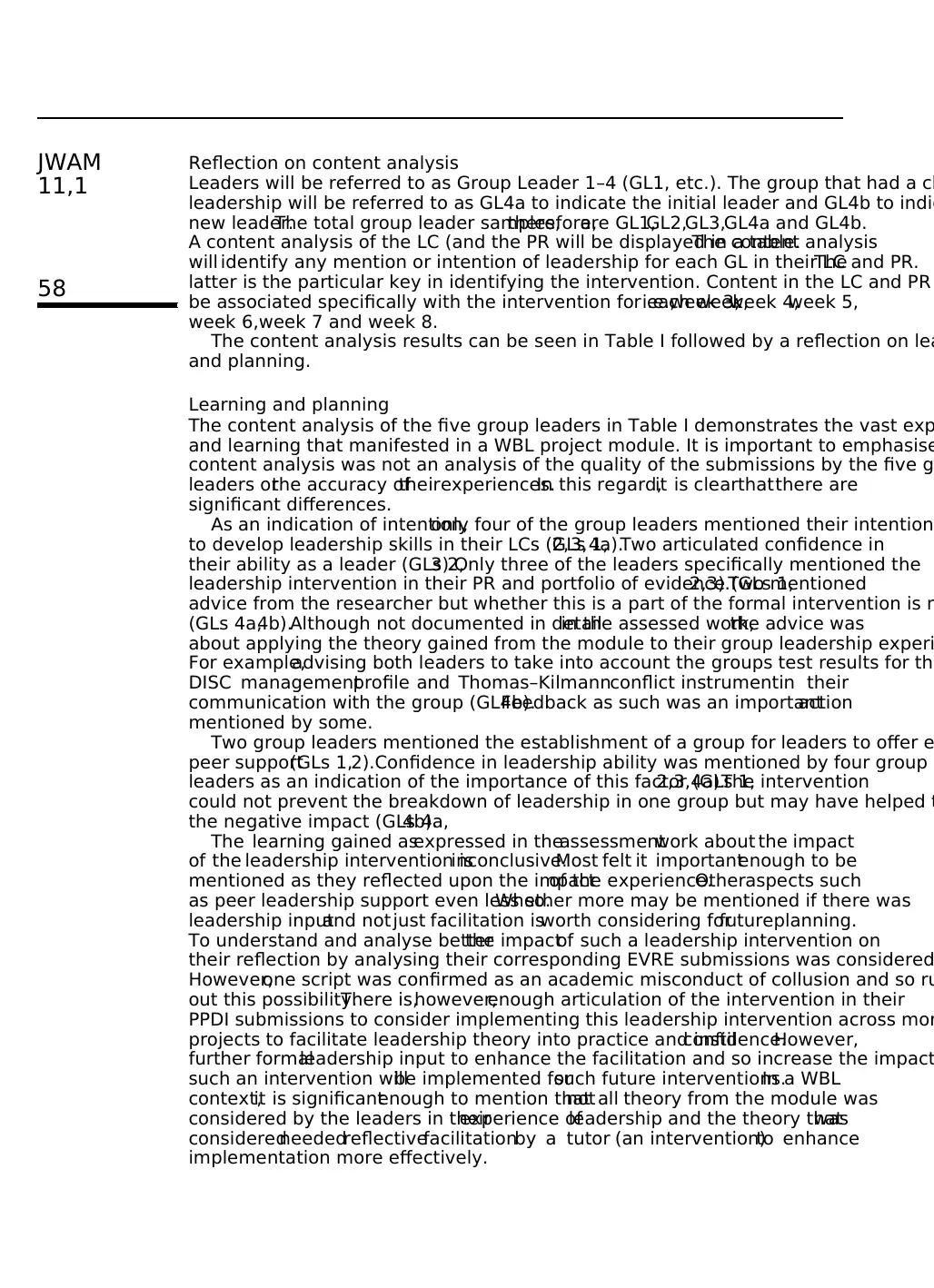
Reflection on content analysis
Leaders will be referred to as Group Leader 1–4 (GL1, etc.). The group that had a ch
leadership will be referred to as GL4a to indicate the initial leader and GL4b to indic
new leader.The total group leader samples,therefore,are GL1,GL2,GL3,GL4a and GL4b.
A content analysis of the LC (and the PR will be displayed in a table.The content analysis
will identify any mention or intention of leadership for each GL in their LC and PR.The
latter is the particular key in identifying the intervention. Content in the LC and PR
be associated specifically with the intervention for each week,i.e.,week 3,week 4,week 5,
week 6,week 7 and week 8.
The content analysis results can be seen in Table I followed by a reflection on lea
and planning.
Learning and planning
The content analysis of the five group leaders in Table I demonstrates the vast exp
and learning that manifested in a WBL project module. It is important to emphasise
content analysis was not an analysis of the quality of the submissions by the five g
leaders orthe accuracy oftheirexperiences.In this regard,it is clearthatthere are
significant differences.
As an indication of intention,only four of the group leaders mentioned their intention
to develop leadership skills in their LCs (GLs 1,2,3,4a).Two articulated confidence in
their ability as a leader (GLs 2,3).Only three of the leaders specifically mentioned the
leadership intervention in their PR and portfolio of evidence (GLs 1,2,3).Two mentioned
advice from the researcher but whether this is a part of the formal intervention is n
(GLs 4a,4b).Although not documented in detailin the assessed work,the advice was
about applying the theory gained from the module to their group leadership experi
For example,advising both leaders to take into account the groups test results for the
DISC managementprofile and Thomas–Kilmannconflict instrumentin their
communication with the group (GL4b).Feedback as such was an importantaction
mentioned by some.
Two group leaders mentioned the establishment of a group for leaders to offer e
peer support(GLs 1,2).Confidence in leadership ability was mentioned by four group
leaders as an indication of the importance of this factor (GLs 1,2,3,4a).The intervention
could not prevent the breakdown of leadership in one group but may have helped t
the negative impact (GLs 4a,4b).
The learning gained asexpressed in theassessmentwork about the impact
of the leadership intervention isinconclusive.Most felt it importantenough to be
mentioned as they reflected upon the impactof the experience.Otheraspects such
as peer leadership support even less so.Whether more may be mentioned if there was
leadership inputand not just facilitation isworth considering forfutureplanning.
To understand and analyse betterthe impactof such a leadership intervention on
their reflection by analysing their corresponding EVRE submissions was considered
However,one script was confirmed as an academic misconduct of collusion and so ru
out this possibility.There is,however,enough articulation of the intervention in their
PPDI submissions to consider implementing this leadership intervention across mor
projects to facilitate leadership theory into practice and instilconfidence.However,
further formalleadership input to enhance the facilitation and so increase the impact
such an intervention willbe implemented forsuch future interventions.In a WBL
context,it is significantenough to mention thatnot all theory from the module was
considered by the leaders in theirexperience ofleadership and the theory thatwas
consideredneededreflectivefacilitationby a tutor (an intervention)to enhance
implementation more effectively.
58
JWAM
11,1
Leaders will be referred to as Group Leader 1–4 (GL1, etc.). The group that had a ch
leadership will be referred to as GL4a to indicate the initial leader and GL4b to indic
new leader.The total group leader samples,therefore,are GL1,GL2,GL3,GL4a and GL4b.
A content analysis of the LC (and the PR will be displayed in a table.The content analysis
will identify any mention or intention of leadership for each GL in their LC and PR.The
latter is the particular key in identifying the intervention. Content in the LC and PR
be associated specifically with the intervention for each week,i.e.,week 3,week 4,week 5,
week 6,week 7 and week 8.
The content analysis results can be seen in Table I followed by a reflection on lea
and planning.
Learning and planning
The content analysis of the five group leaders in Table I demonstrates the vast exp
and learning that manifested in a WBL project module. It is important to emphasise
content analysis was not an analysis of the quality of the submissions by the five g
leaders orthe accuracy oftheirexperiences.In this regard,it is clearthatthere are
significant differences.
As an indication of intention,only four of the group leaders mentioned their intention
to develop leadership skills in their LCs (GLs 1,2,3,4a).Two articulated confidence in
their ability as a leader (GLs 2,3).Only three of the leaders specifically mentioned the
leadership intervention in their PR and portfolio of evidence (GLs 1,2,3).Two mentioned
advice from the researcher but whether this is a part of the formal intervention is n
(GLs 4a,4b).Although not documented in detailin the assessed work,the advice was
about applying the theory gained from the module to their group leadership experi
For example,advising both leaders to take into account the groups test results for the
DISC managementprofile and Thomas–Kilmannconflict instrumentin their
communication with the group (GL4b).Feedback as such was an importantaction
mentioned by some.
Two group leaders mentioned the establishment of a group for leaders to offer e
peer support(GLs 1,2).Confidence in leadership ability was mentioned by four group
leaders as an indication of the importance of this factor (GLs 1,2,3,4a).The intervention
could not prevent the breakdown of leadership in one group but may have helped t
the negative impact (GLs 4a,4b).
The learning gained asexpressed in theassessmentwork about the impact
of the leadership intervention isinconclusive.Most felt it importantenough to be
mentioned as they reflected upon the impactof the experience.Otheraspects such
as peer leadership support even less so.Whether more may be mentioned if there was
leadership inputand not just facilitation isworth considering forfutureplanning.
To understand and analyse betterthe impactof such a leadership intervention on
their reflection by analysing their corresponding EVRE submissions was considered
However,one script was confirmed as an academic misconduct of collusion and so ru
out this possibility.There is,however,enough articulation of the intervention in their
PPDI submissions to consider implementing this leadership intervention across mor
projects to facilitate leadership theory into practice and instilconfidence.However,
further formalleadership input to enhance the facilitation and so increase the impact
such an intervention willbe implemented forsuch future interventions.In a WBL
context,it is significantenough to mention thatnot all theory from the module was
considered by the leaders in theirexperience ofleadership and the theory thatwas
consideredneededreflectivefacilitationby a tutor (an intervention)to enhance
implementation more effectively.
58
JWAM
11,1
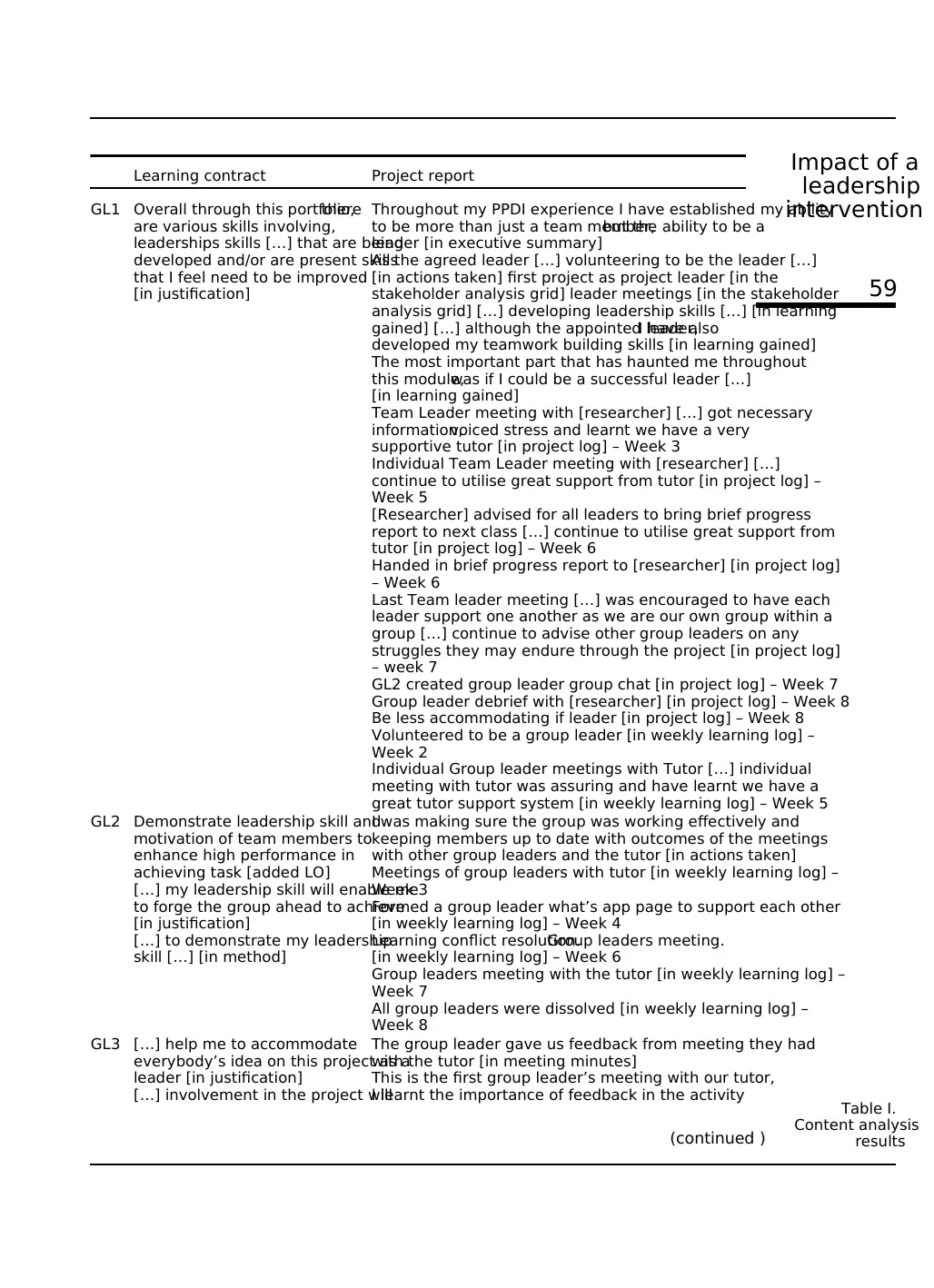
Learning contract Project report
GL1 Overall through this portfolio,there
are various skills involving,
leaderships skills […] that are being
developed and/or are present skills
that I feel need to be improved
[in justification]
Throughout my PPDI experience I have established my ability
to be more than just a team member,but the ability to be a
leader [in executive summary]
As the agreed leader […] volunteering to be the leader […]
[in actions taken] first project as project leader [in the
stakeholder analysis grid] leader meetings [in the stakeholder
analysis grid] […] developing leadership skills […] [in learning
gained] […] although the appointed leader,I have also
developed my teamwork building skills [in learning gained]
The most important part that has haunted me throughout
this module,was if I could be a successful leader […]
[in learning gained]
Team Leader meeting with [researcher] […] got necessary
information,voiced stress and learnt we have a very
supportive tutor [in project log] – Week 3
Individual Team Leader meeting with [researcher] […]
continue to utilise great support from tutor [in project log] –
Week 5
[Researcher] advised for all leaders to bring brief progress
report to next class […] continue to utilise great support from
tutor [in project log] – Week 6
Handed in brief progress report to [researcher] [in project log]
– Week 6
Last Team leader meeting […] was encouraged to have each
leader support one another as we are our own group within a
group […] continue to advise other group leaders on any
struggles they may endure through the project [in project log]
– week 7
GL2 created group leader group chat [in project log] – Week 7
Group leader debrief with [researcher] [in project log] – Week 8
Be less accommodating if leader [in project log] – Week 8
Volunteered to be a group leader [in weekly learning log] –
Week 2
Individual Group leader meetings with Tutor […] individual
meeting with tutor was assuring and have learnt we have a
great tutor support system [in weekly learning log] – Week 5
GL2 Demonstrate leadership skill and
motivation of team members to
enhance high performance in
achieving task [added LO]
[…] my leadership skill will enable me
to forge the group ahead to achieve
[in justification]
[…] to demonstrate my leadership
skill […] [in method]
I was making sure the group was working effectively and
keeping members up to date with outcomes of the meetings
with other group leaders and the tutor [in actions taken]
Meetings of group leaders with tutor [in weekly learning log] –
Week 3
Formed a group leader what’s app page to support each other
[in weekly learning log] – Week 4
Learning conflict resolution.Group leaders meeting.
[in weekly learning log] – Week 6
Group leaders meeting with the tutor [in weekly learning log] –
Week 7
All group leaders were dissolved [in weekly learning log] –
Week 8
GL3 […] help me to accommodate
everybody’s idea on this project as a
leader [in justification]
[…] involvement in the project will
The group leader gave us feedback from meeting they had
with the tutor [in meeting minutes]
This is the first group leader’s meeting with our tutor,
l learnt the importance of feedback in the activity
(continued )
Table I.
Content analysis
results
59
Impact of a
leadership
intervention
GL1 Overall through this portfolio,there
are various skills involving,
leaderships skills […] that are being
developed and/or are present skills
that I feel need to be improved
[in justification]
Throughout my PPDI experience I have established my ability
to be more than just a team member,but the ability to be a
leader [in executive summary]
As the agreed leader […] volunteering to be the leader […]
[in actions taken] first project as project leader [in the
stakeholder analysis grid] leader meetings [in the stakeholder
analysis grid] […] developing leadership skills […] [in learning
gained] […] although the appointed leader,I have also
developed my teamwork building skills [in learning gained]
The most important part that has haunted me throughout
this module,was if I could be a successful leader […]
[in learning gained]
Team Leader meeting with [researcher] […] got necessary
information,voiced stress and learnt we have a very
supportive tutor [in project log] – Week 3
Individual Team Leader meeting with [researcher] […]
continue to utilise great support from tutor [in project log] –
Week 5
[Researcher] advised for all leaders to bring brief progress
report to next class […] continue to utilise great support from
tutor [in project log] – Week 6
Handed in brief progress report to [researcher] [in project log]
– Week 6
Last Team leader meeting […] was encouraged to have each
leader support one another as we are our own group within a
group […] continue to advise other group leaders on any
struggles they may endure through the project [in project log]
– week 7
GL2 created group leader group chat [in project log] – Week 7
Group leader debrief with [researcher] [in project log] – Week 8
Be less accommodating if leader [in project log] – Week 8
Volunteered to be a group leader [in weekly learning log] –
Week 2
Individual Group leader meetings with Tutor […] individual
meeting with tutor was assuring and have learnt we have a
great tutor support system [in weekly learning log] – Week 5
GL2 Demonstrate leadership skill and
motivation of team members to
enhance high performance in
achieving task [added LO]
[…] my leadership skill will enable me
to forge the group ahead to achieve
[in justification]
[…] to demonstrate my leadership
skill […] [in method]
I was making sure the group was working effectively and
keeping members up to date with outcomes of the meetings
with other group leaders and the tutor [in actions taken]
Meetings of group leaders with tutor [in weekly learning log] –
Week 3
Formed a group leader what’s app page to support each other
[in weekly learning log] – Week 4
Learning conflict resolution.Group leaders meeting.
[in weekly learning log] – Week 6
Group leaders meeting with the tutor [in weekly learning log] –
Week 7
All group leaders were dissolved [in weekly learning log] –
Week 8
GL3 […] help me to accommodate
everybody’s idea on this project as a
leader [in justification]
[…] involvement in the project will
The group leader gave us feedback from meeting they had
with the tutor [in meeting minutes]
This is the first group leader’s meeting with our tutor,
l learnt the importance of feedback in the activity
(continued )
Table I.
Content analysis
results
59
Impact of a
leadership
intervention
Paraphrase This Document
Need a fresh take? Get an instant paraphrase of this document with our AI Paraphraser
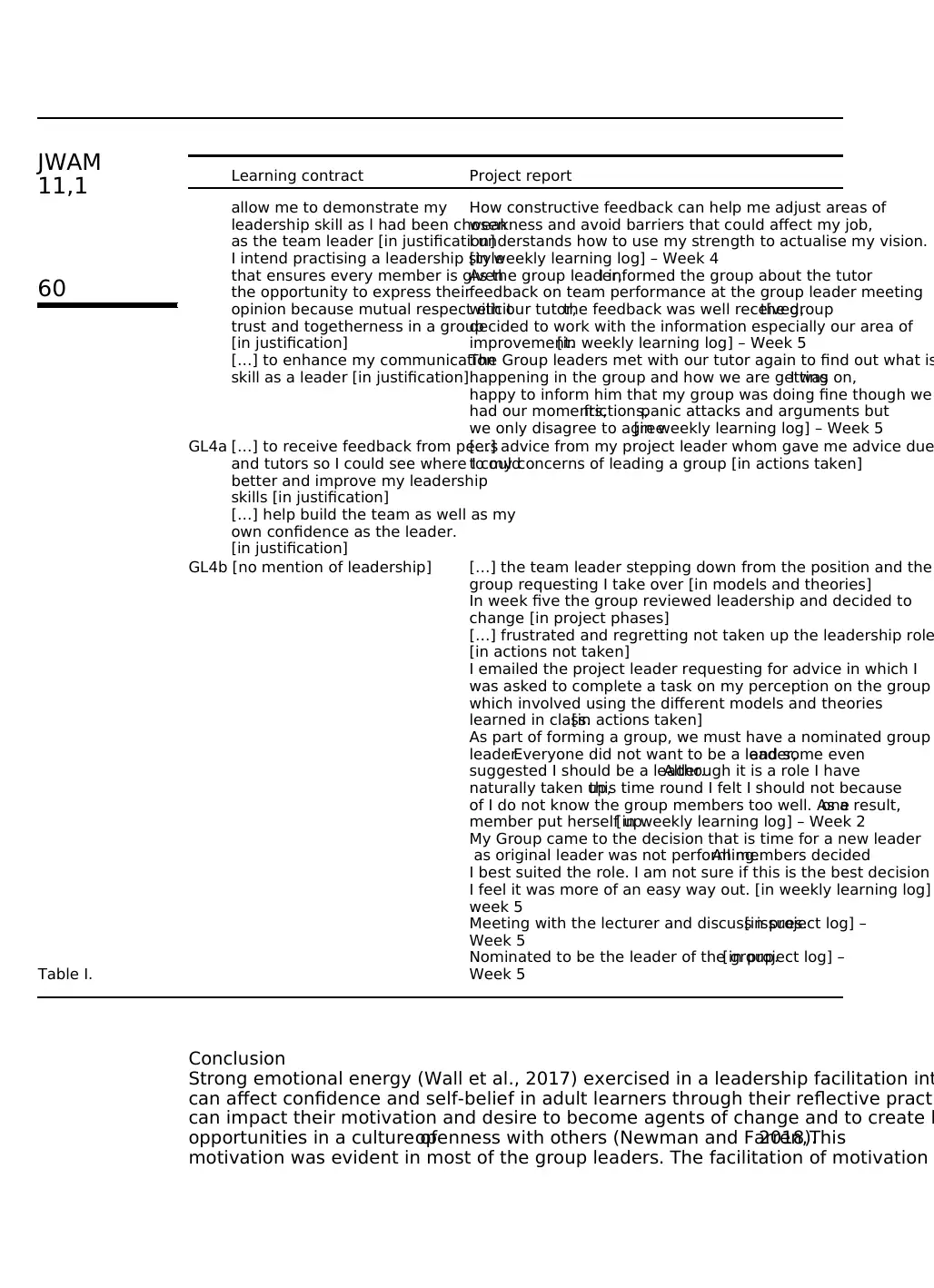
Conclusion
Strong emotional energy (Wall et al., 2017) exercised in a leadership facilitation int
can affect confidence and self-belief in adult learners through their reflective practi
can impact their motivation and desire to become agents of change and to create l
opportunities in a culture ofopenness with others (Newman and Farren,2018).This
motivation was evident in most of the group leaders. The facilitation of motivation
Learning contract Project report
allow me to demonstrate my
leadership skill as l had been chosen
as the team leader [in justification]
I intend practising a leadership style
that ensures every member is given
the opportunity to express their
opinion because mutual respect elicit
trust and togetherness in a group
[in justification]
[…] to enhance my communication
skill as a leader [in justification]
How constructive feedback can help me adjust areas of
weakness and avoid barriers that could affect my job,
l understands how to use my strength to actualise my vision.
[in weekly learning log] – Week 4
As the group leader,I informed the group about the tutor
feedback on team performance at the group leader meeting
with our tutor,the feedback was well received,the group
decided to work with the information especially our area of
improvement.[in weekly learning log] – Week 5
The Group leaders met with our tutor again to find out what is
happening in the group and how we are getting on,I was
happy to inform him that my group was doing fine though we
had our moments,frictions,panic attacks and arguments but
we only disagree to agree.[in weekly learning log] – Week 5
GL4a […] to receive feedback from peers
and tutors so I could see where I could
better and improve my leadership
skills [in justification]
[…] help build the team as well as my
own confidence as the leader.
[in justification]
[…] advice from my project leader whom gave me advice due
to my concerns of leading a group [in actions taken]
GL4b [no mention of leadership] […] the team leader stepping down from the position and the
group requesting I take over [in models and theories]
In week five the group reviewed leadership and decided to
change [in project phases]
[…] frustrated and regretting not taken up the leadership role
[in actions not taken]
I emailed the project leader requesting for advice in which I
was asked to complete a task on my perception on the group
which involved using the different models and theories
learned in class.[in actions taken]
As part of forming a group, we must have a nominated group
leader.Everyone did not want to be a leader,and some even
suggested I should be a leader.Although it is a role I have
naturally taken up,this time round I felt I should not because
of I do not know the group members too well. As a result,one
member put herself up.[in weekly learning log] – Week 2
My Group came to the decision that is time for a new leader
as original leader was not performing.All members decided
I best suited the role. I am not sure if this is the best decision
I feel it was more of an easy way out. [in weekly learning log]
week 5
Meeting with the lecturer and discuss issues.[in project log] –
Week 5
Nominated to be the leader of the group.[in project log] –
Week 5Table I.
60
JWAM
11,1
Strong emotional energy (Wall et al., 2017) exercised in a leadership facilitation int
can affect confidence and self-belief in adult learners through their reflective practi
can impact their motivation and desire to become agents of change and to create l
opportunities in a culture ofopenness with others (Newman and Farren,2018).This
motivation was evident in most of the group leaders. The facilitation of motivation
Learning contract Project report
allow me to demonstrate my
leadership skill as l had been chosen
as the team leader [in justification]
I intend practising a leadership style
that ensures every member is given
the opportunity to express their
opinion because mutual respect elicit
trust and togetherness in a group
[in justification]
[…] to enhance my communication
skill as a leader [in justification]
How constructive feedback can help me adjust areas of
weakness and avoid barriers that could affect my job,
l understands how to use my strength to actualise my vision.
[in weekly learning log] – Week 4
As the group leader,I informed the group about the tutor
feedback on team performance at the group leader meeting
with our tutor,the feedback was well received,the group
decided to work with the information especially our area of
improvement.[in weekly learning log] – Week 5
The Group leaders met with our tutor again to find out what is
happening in the group and how we are getting on,I was
happy to inform him that my group was doing fine though we
had our moments,frictions,panic attacks and arguments but
we only disagree to agree.[in weekly learning log] – Week 5
GL4a […] to receive feedback from peers
and tutors so I could see where I could
better and improve my leadership
skills [in justification]
[…] help build the team as well as my
own confidence as the leader.
[in justification]
[…] advice from my project leader whom gave me advice due
to my concerns of leading a group [in actions taken]
GL4b [no mention of leadership] […] the team leader stepping down from the position and the
group requesting I take over [in models and theories]
In week five the group reviewed leadership and decided to
change [in project phases]
[…] frustrated and regretting not taken up the leadership role
[in actions not taken]
I emailed the project leader requesting for advice in which I
was asked to complete a task on my perception on the group
which involved using the different models and theories
learned in class.[in actions taken]
As part of forming a group, we must have a nominated group
leader.Everyone did not want to be a leader,and some even
suggested I should be a leader.Although it is a role I have
naturally taken up,this time round I felt I should not because
of I do not know the group members too well. As a result,one
member put herself up.[in weekly learning log] – Week 2
My Group came to the decision that is time for a new leader
as original leader was not performing.All members decided
I best suited the role. I am not sure if this is the best decision
I feel it was more of an easy way out. [in weekly learning log]
week 5
Meeting with the lecturer and discuss issues.[in project log] –
Week 5
Nominated to be the leader of the group.[in project log] –
Week 5Table I.
60
JWAM
11,1
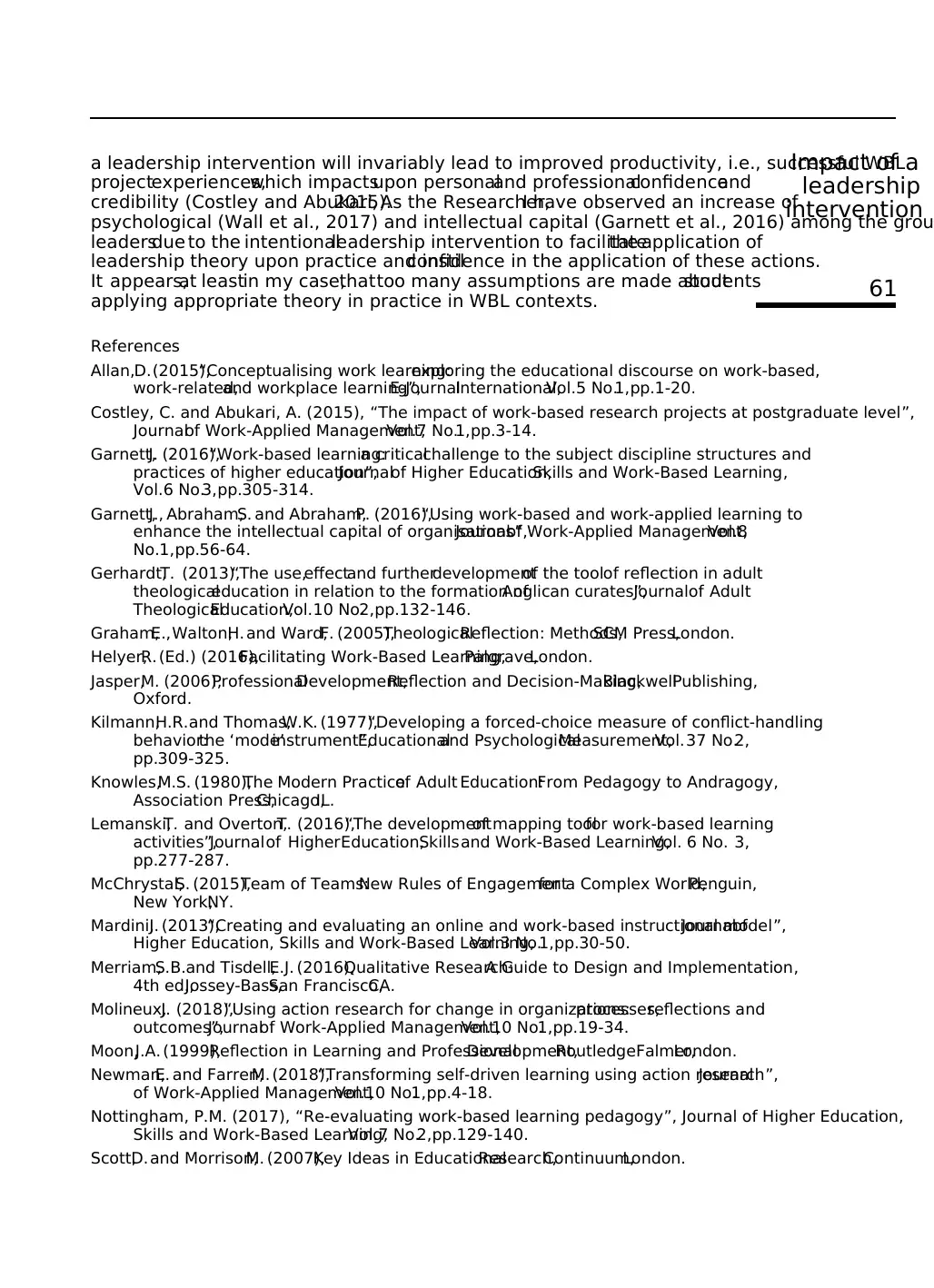
a leadership intervention will invariably lead to improved productivity, i.e., successful WBL
projectexperiences,which impactsupon personaland professionalconfidenceand
credibility (Costley and Abukari,2015).As the Researcher,I have observed an increase of
psychological (Wall et al., 2017) and intellectual capital (Garnett et al., 2016) among the grou
leadersdue to the intentionalleadership intervention to facilitatethe application of
leadership theory upon practice and instilconfidence in the application of these actions.
It appears,at leastin my case,thattoo many assumptions are made aboutstudents
applying appropriate theory in practice in WBL contexts.
References
Allan,D.(2015),“Conceptualising work learning:exploring the educational discourse on work-based,
work-related,and workplace learning”,E-JournalInternational,Vol.5 No.1,pp.1-20.
Costley, C. and Abukari, A. (2015), “The impact of work-based research projects at postgraduate level”,
Journalof Work-Applied Management,Vol.7 No.1,pp.3-14.
Garnett,J. (2016),“Work-based learning:a criticalchallenge to the subject discipline structures and
practices of higher education”,Journalof Higher Education,Skills and Work-Based Learning,
Vol.6 No.3,pp.305-314.
Garnett,J., Abraham,S. and Abraham,P. (2016),“Using work-based and work-applied learning to
enhance the intellectual capital of organisations”,Journalof Work-Applied Management,Vol.8
No.1,pp.56-64.
Gerhardt,T. (2013),“The use,effectand furtherdevelopmentof the toolof reflection in adult
theologicaleducation in relation to the formation ofAnglican curates”,Journalof Adult
TheologicalEducation,Vol.10 No.2,pp.132-146.
Graham,E.,Walton,H. and Ward,F. (2005),TheologicalReflection: Methods,SCM Press,London.
Helyer,R. (Ed.) (2016),Facilitating Work-Based Learning,Palgrave,London.
Jasper,M. (2006),ProfessionalDevelopment,Reflection and Decision-Making,BlackwellPublishing,
Oxford.
Kilmann,H.R.and Thomas,W.K. (1977),“Developing a forced-choice measure of conflict-handling
behavior:the ‘mode’instrument”,Educationaland PsychologicalMeasurement,Vol.37 No.2,
pp.309-325.
Knowles,M.S. (1980),The Modern Practiceof Adult Education:From Pedagogy to Andragogy,
Association Press,Chicago,IL.
Lemanski,T. and Overton,T. (2016),“The developmentof mapping toolfor work-based learning
activities”,Journalof HigherEducation,Skillsand Work-Based Learning,Vol. 6 No. 3,
pp.277-287.
McChrystal,S. (2015),Team of Teams:New Rules of Engagementfor a Complex World,Penguin,
New York,NY.
Mardini,J. (2013),“Creating and evaluating an online and work-based instructional model”,Journalof
Higher Education, Skills and Work-Based Learning,Vol.3 No.1,pp.30-50.
Merriam,S.B.and Tisdell,E.J. (2016),Qualitative Research:A Guide to Design and Implementation,
4th ed.,Jossey-Bass,San Francisco,CA.
Molineux,J. (2018),“Using action research for change in organizations:processes,reflections and
outcomes”,Journalof Work-Applied Management,Vol.10 No.1,pp.19-34.
Moon,J.A. (1999),Reflection in Learning and ProfessionalDevelopment,RoutledgeFalmer,London.
Newman,E. and Farren,M. (2018),“Transforming self-driven learning using action research”,Journal
of Work-Applied Management,Vol.10 No.1,pp.4-18.
Nottingham, P.M. (2017), “Re-evaluating work-based learning pedagogy”, Journal of Higher Education,
Skills and Work-Based Learning,Vol.7 No.2,pp.129-140.
Scott,D.and Morrison,M. (2007),Key Ideas in EducationalResearch,Continuum,London.
61
Impact of a
leadership
intervention
projectexperiences,which impactsupon personaland professionalconfidenceand
credibility (Costley and Abukari,2015).As the Researcher,I have observed an increase of
psychological (Wall et al., 2017) and intellectual capital (Garnett et al., 2016) among the grou
leadersdue to the intentionalleadership intervention to facilitatethe application of
leadership theory upon practice and instilconfidence in the application of these actions.
It appears,at leastin my case,thattoo many assumptions are made aboutstudents
applying appropriate theory in practice in WBL contexts.
References
Allan,D.(2015),“Conceptualising work learning:exploring the educational discourse on work-based,
work-related,and workplace learning”,E-JournalInternational,Vol.5 No.1,pp.1-20.
Costley, C. and Abukari, A. (2015), “The impact of work-based research projects at postgraduate level”,
Journalof Work-Applied Management,Vol.7 No.1,pp.3-14.
Garnett,J. (2016),“Work-based learning:a criticalchallenge to the subject discipline structures and
practices of higher education”,Journalof Higher Education,Skills and Work-Based Learning,
Vol.6 No.3,pp.305-314.
Garnett,J., Abraham,S. and Abraham,P. (2016),“Using work-based and work-applied learning to
enhance the intellectual capital of organisations”,Journalof Work-Applied Management,Vol.8
No.1,pp.56-64.
Gerhardt,T. (2013),“The use,effectand furtherdevelopmentof the toolof reflection in adult
theologicaleducation in relation to the formation ofAnglican curates”,Journalof Adult
TheologicalEducation,Vol.10 No.2,pp.132-146.
Graham,E.,Walton,H. and Ward,F. (2005),TheologicalReflection: Methods,SCM Press,London.
Helyer,R. (Ed.) (2016),Facilitating Work-Based Learning,Palgrave,London.
Jasper,M. (2006),ProfessionalDevelopment,Reflection and Decision-Making,BlackwellPublishing,
Oxford.
Kilmann,H.R.and Thomas,W.K. (1977),“Developing a forced-choice measure of conflict-handling
behavior:the ‘mode’instrument”,Educationaland PsychologicalMeasurement,Vol.37 No.2,
pp.309-325.
Knowles,M.S. (1980),The Modern Practiceof Adult Education:From Pedagogy to Andragogy,
Association Press,Chicago,IL.
Lemanski,T. and Overton,T. (2016),“The developmentof mapping toolfor work-based learning
activities”,Journalof HigherEducation,Skillsand Work-Based Learning,Vol. 6 No. 3,
pp.277-287.
McChrystal,S. (2015),Team of Teams:New Rules of Engagementfor a Complex World,Penguin,
New York,NY.
Mardini,J. (2013),“Creating and evaluating an online and work-based instructional model”,Journalof
Higher Education, Skills and Work-Based Learning,Vol.3 No.1,pp.30-50.
Merriam,S.B.and Tisdell,E.J. (2016),Qualitative Research:A Guide to Design and Implementation,
4th ed.,Jossey-Bass,San Francisco,CA.
Molineux,J. (2018),“Using action research for change in organizations:processes,reflections and
outcomes”,Journalof Work-Applied Management,Vol.10 No.1,pp.19-34.
Moon,J.A. (1999),Reflection in Learning and ProfessionalDevelopment,RoutledgeFalmer,London.
Newman,E. and Farren,M. (2018),“Transforming self-driven learning using action research”,Journal
of Work-Applied Management,Vol.10 No.1,pp.4-18.
Nottingham, P.M. (2017), “Re-evaluating work-based learning pedagogy”, Journal of Higher Education,
Skills and Work-Based Learning,Vol.7 No.2,pp.129-140.
Scott,D.and Morrison,M. (2007),Key Ideas in EducationalResearch,Continuum,London.
61
Impact of a
leadership
intervention
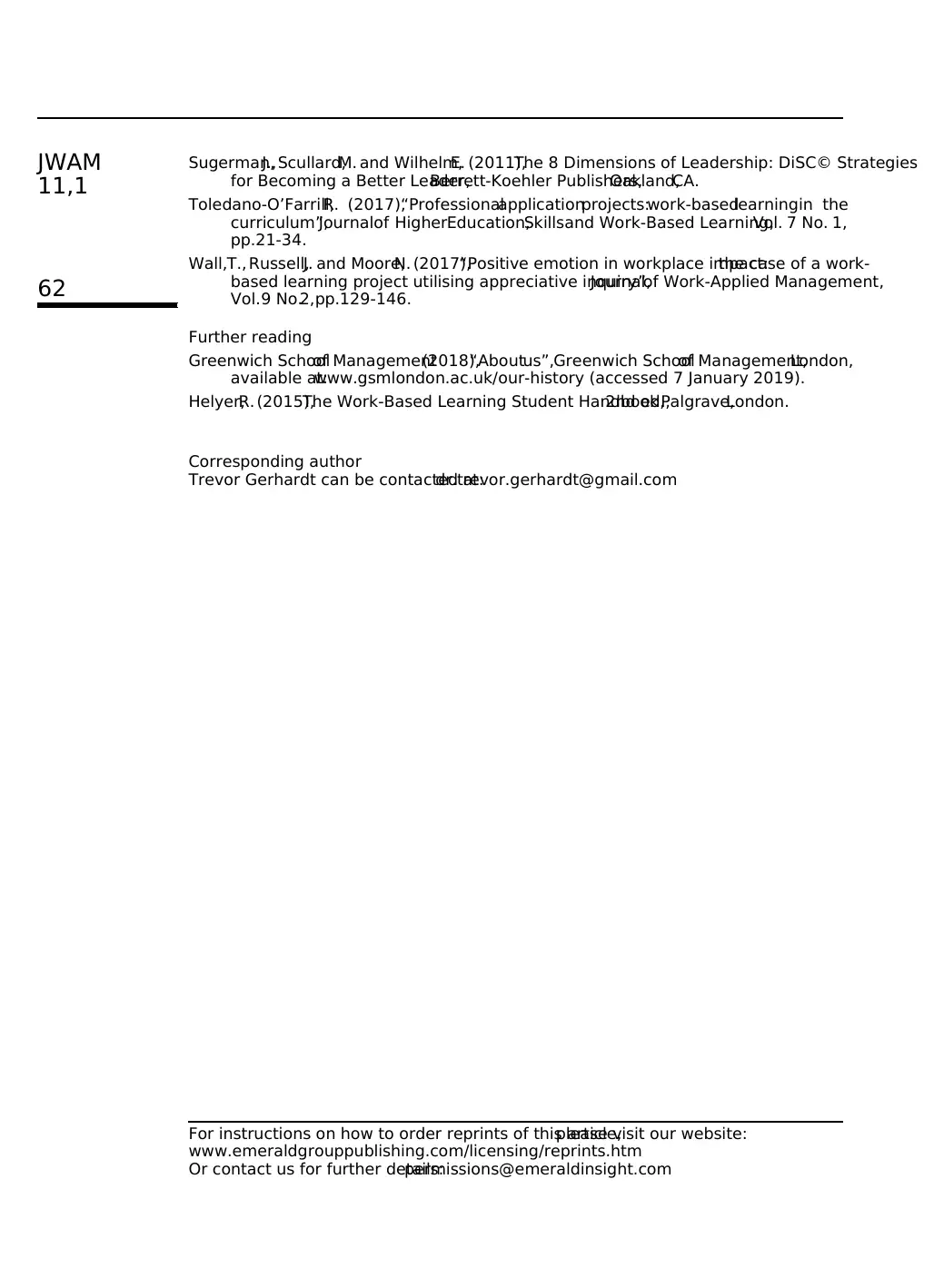
Sugerman,J.,Scullard,M. and Wilhelm,E. (2011),The 8 Dimensions of Leadership: DiSC© Strategies
for Becoming a Better Leader,Berrett-Koehler Publishers,Oakland,CA.
Toledano-O’Farrill,R. (2017),“Professionalapplicationprojects:work-basedlearningin the
curriculum”,Journalof HigherEducation,Skillsand Work-Based Learning,Vol. 7 No. 1,
pp.21-34.
Wall,T., Russell,J. and Moore,N. (2017),“Positive emotion in workplace impact:the case of a work-
based learning project utilising appreciative inquiry”,Journalof Work-Applied Management,
Vol.9 No.2,pp.129-146.
Further reading
Greenwich Schoolof Management(2018),“Aboutus”,Greenwich Schoolof Management,London,
available at:www.gsmlondon.ac.uk/our-history (accessed 7 January 2019).
Helyer,R. (2015),The Work-Based Learning Student Handbook,2nd ed.,Palgrave,London.
Corresponding author
Trevor Gerhardt can be contacted at:dr.trevor.gerhardt@gmail.com
For instructions on how to order reprints of this article,please visit our website:
www.emeraldgrouppublishing.com/licensing/reprints.htm
Or contact us for further details:permissions@emeraldinsight.com
62
JWAM
11,1
for Becoming a Better Leader,Berrett-Koehler Publishers,Oakland,CA.
Toledano-O’Farrill,R. (2017),“Professionalapplicationprojects:work-basedlearningin the
curriculum”,Journalof HigherEducation,Skillsand Work-Based Learning,Vol. 7 No. 1,
pp.21-34.
Wall,T., Russell,J. and Moore,N. (2017),“Positive emotion in workplace impact:the case of a work-
based learning project utilising appreciative inquiry”,Journalof Work-Applied Management,
Vol.9 No.2,pp.129-146.
Further reading
Greenwich Schoolof Management(2018),“Aboutus”,Greenwich Schoolof Management,London,
available at:www.gsmlondon.ac.uk/our-history (accessed 7 January 2019).
Helyer,R. (2015),The Work-Based Learning Student Handbook,2nd ed.,Palgrave,London.
Corresponding author
Trevor Gerhardt can be contacted at:dr.trevor.gerhardt@gmail.com
For instructions on how to order reprints of this article,please visit our website:
www.emeraldgrouppublishing.com/licensing/reprints.htm
Or contact us for further details:permissions@emeraldinsight.com
62
JWAM
11,1
1 out of 10
Your All-in-One AI-Powered Toolkit for Academic Success.
+13062052269
info@desklib.com
Available 24*7 on WhatsApp / Email
![[object Object]](/_next/static/media/star-bottom.7253800d.svg)
Unlock your academic potential
© 2024 | Zucol Services PVT LTD | All rights reserved.